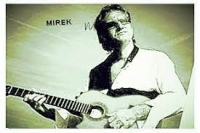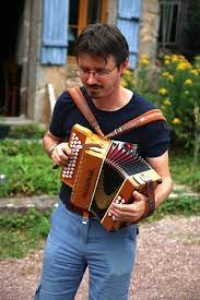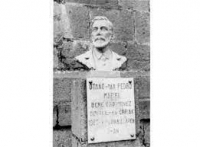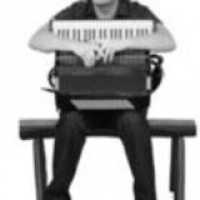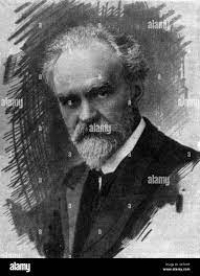Accordion Sheet Music
 "Music is your own experience, your thoughts, your wisdom. If you don't live it, it won't come out of your horn. " Charlie Parker
"Music is your own experience, your thoughts, your wisdom. If you don't live it, it won't come out of your horn. " Charlie Parker
Van Halen

Van Halen is a hard rock band formed in Pasadena, California in 1972. They enjoyed success from the release of their self titled debut album in 1978. As of 2007 Van Halen has sold more than 80 million albums worldwide and have had the most number one hits on the Billboard Mainstream Rock chart. During the 1980's they also had more Billboard Hot 100 hits than any other hard rock, heavy metal band of the decade. According to the Recording Industry Association of America, Van Halen is the 19th best selling band/artist of all time with sales of over 56 million albums in the USA and is one of five rock bands that have had two albums sell more than 10 million copies in the USA.
In addition to being recognized for success, the band is known for the drama surrounding the exits of former members. The (multiple) exits of singers Sammy Hagar and David Lee Roth were surrounded in controversy and mass press coverage with various contrasting press statements between them and the band. More recently, founding bassist Michael Anthony was kicked out of the band for controversial reasons. Following their 2004 concert tour the band was on a hiatus from the public until September 2006, when new bassist Wolfgang Van Halen's place was confirmed and Roth-reunion rumours began to re-surface coinciding with the band's Rock and Roll Hall of Fame induction on March 12, 2007. After years of speculation, Van Halen began a tour with Roth in late 2007 across North America, which has been extended into 2008. An album is proposed to follow. Along with this, a live tour DVD was announced at their May 13, 2008 concert at the Izod Center that would contain recordings from several performances on their current tour.
Current members:
David Lee Roth – Lead vocals, acoustic guitar
Eddie Van Halen – Guitars, keyboards, bass, backing vocals
Wolfgang Van Halen – Bass, backing vocals
Alex Van Halen – Drums, percussion, backing vocals
In addition to being recognized for success, the band is known for the drama surrounding the exits of former members. The (multiple) exits of singers Sammy Hagar and David Lee Roth were surrounded in controversy and mass press coverage with various contrasting press statements between them and the band. More recently, founding bassist Michael Anthony was kicked out of the band for controversial reasons. Following their 2004 concert tour the band was on a hiatus from the public until September 2006, when new bassist Wolfgang Van Halen's place was confirmed and Roth-reunion rumours began to re-surface coinciding with the band's Rock and Roll Hall of Fame induction on March 12, 2007. After years of speculation, Van Halen began a tour with Roth in late 2007 across North America, which has been extended into 2008. An album is proposed to follow. Along with this, a live tour DVD was announced at their May 13, 2008 concert at the Izod Center that would contain recordings from several performances on their current tour.
Current members:
David Lee Roth – Lead vocals, acoustic guitar
Eddie Van Halen – Guitars, keyboards, bass, backing vocals
Wolfgang Van Halen – Bass, backing vocals
Alex Van Halen – Drums, percussion, backing vocals
Don Quattrocchi
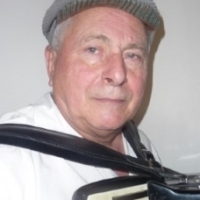
Don Quattrocchi contributed most of his life promoting the piano accordion. During the 70s he had the largest music school in country Victoria in Australia.During his career he taught music at Kilmore Assumption College, Notre Dame College and Goulbourn Valley Grammar School.At that time there were no accordion exams in the state of Victoria. Don composed music for accordion exams which was accepted by the Australian Guild of Music and Speech.At retirement, Don enjoys writing arrangements of popular songs played on the piano accordion. He offers his arrangements on this website free of charge, to promote the accordion and assist people around the world who would like to learn the accordion, with easy to intermediate arrangements.
Traditional

Gorka Hermosa

Gorka Hermosa was the first Spanish accordionist to play as soloist with an symphonic orchestra (the Spanish National Radio and TV orchestra and after more than 12 times with other different orchestras), he often appears in Spanish TV and radio shows and gives concerts all around Europe (Finland, Norway, Estonia, Germany, Slovenia, Switzerland, France, Italy, Portugal and Spain). He has played first time more than 20 works for accordion of Spanish composers. He has also played varied musical styles including flamenco, fado, folk, pop-rock, jazz, techno, fusion… playing with musicians as Paquito D`Rivera (Grammy Awarded), Javier Peixoto (Madredeus), Pablo Zinger, Ara Malikian, La Mari (Chambao), Luis Auserón (Radio Futura), Carmen París, José Luis Montón, Germán Díaz, Baldo Martínez, Carlos Soto (Celtas Cortos), Nacho Mastretta, India Martínez...
Grigoras Dinicu

Grigoraș Ionică Dinicu was a Romanian violin virtuoso and composer of Roma ethnicity. He is most famous for his often-played virtuoso violin showpiece "Hora staccato" and for making popular the tune Ciocârlia, composed by his grandfather Angheluș Dinicu for "nai".
Egberto Gismonti

Egberto Amin Gismonti (born December 5, 1947 in Carmo, state of Rio de Janeiro) is a Brazilian composer, guitarist and pianist.Gismonti was born in the small city of Carmo, state of Rio de Janeiro, Brazil, into a musical family. His mother was from Sicily and his father was from Beirut, Lebanon. At the age of six, he started studying the piano at the Brazilian Conservatory of Music. After studying the classical repertoire in Brazil for fifteen years, he went to Paris to delve into modern music. He studied with Nadia Boulanger (1887–1979), after acceptance as a student by the composer Jean Barraqué, a student of Anton Webern and Schoenberg. Boulanger encouraged Gismonti to write the collective Brazilian experience into his music.
Vladimir Vlasov
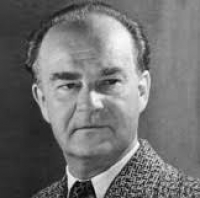
Vladimir Aleksandrovich Vlasov was a Soviet and Russian composer and conductor. He studied at the Moscow Conservatory from 1924 to 1931 under such teachers as Georgy Catoire, Abram Yampolsky, and Nikolai Zhilyayev.
Federico Mompou

Federico (Frederic) Mompou i Dencausse (16 April 1893 – 30 June 1987) was a Spanish Catalan composer and pianist. He is best known for his solo piano music and his songs.
Mompou is best known as a miniaturist, writing short, relatively improvisatory music often described as "delicate" or "intimate." His principal influences were French impressionism and Erik Satie, resulting in a style in which musical development is minimized, and expression is concentrated into very small forms. He was fond of ostinato figures, bell imitations, and a kind of incantatory, meditative sound, the most complete expression of which can be found in his masterpiece "Musica Callada" (or the "Voice of Silence") based on the mystic poetry of Saint John of the Cross. He often dispensed with bar lines and key signatures.
Mompou is best known as a miniaturist, writing short, relatively improvisatory music often described as "delicate" or "intimate." His principal influences were French impressionism and Erik Satie, resulting in a style in which musical development is minimized, and expression is concentrated into very small forms. He was fond of ostinato figures, bell imitations, and a kind of incantatory, meditative sound, the most complete expression of which can be found in his masterpiece "Musica Callada" (or the "Voice of Silence") based on the mystic poetry of Saint John of the Cross. He often dispensed with bar lines and key signatures.
Franco cambereri

Melbourne composer Franco Cambareri was barely able to walk when he first heard the magic sound of the piano accordion - an instrument he promptly felt in love with and dreamed of one day possessing.From the shores of the Calabria region of Italy and at the tender age of fifteen, Franco boarded the steamer Neptune to make the long voyage down under and soon after arriving in Melbourne he started working to help pay for the rest of his family to join him in Australia.Franco was seventeen when he finally had enough money to put a deposit on an accordion and pay for one music lesson per week - his determination to learn meant he spent many a long hour in study and practice.
Isaac Albeniz

Isaac Albéniz i Pascual (Spanish pronunciation: ) (May 29, 1860 – May 18, 1909) was a Spanish pianist and composer best known for his piano works based on folk music.
Albéniz’ Suite Española Op.47 is comprised mainly of pieces written in 1886, and grouped together in 1887 in honor of the Queen of Spain. Like many of Albéniz' piano pieces, these works are miniature tone pictures of different geographical regions and musical idioms of Spain. The eight original titles are Granada, Cataluna, Sevilla, Cadiz, Asturias, Aragon, Castilla and Cuba but only the first three titles and Cuba appeared in the original collection. The other pieces were published in later collections, often with different titles. The publisher Hofmeister published all eight titles of Suite Espanola in 1911 after Albéniz’ death, appropriating other pieces for the other four titles so those pieces do not always accurately reflect the geographic designation of the titles, most obviously in the case of Asturias (Leyenda) whose Andalusian flamenco rhythms bear little resemblance to the music of the northern province Asturias. The opus number 47 assigned by Hofmeister has no relation to any chronological order in Albéniz’ oeuvre, in which opus numbers were randomly given by publishers or by Albéniz himself, with some pieces appearing in more than one collection.
Albéniz’ Suite Española Op.47 is comprised mainly of pieces written in 1886, and grouped together in 1887 in honor of the Queen of Spain. Like many of Albéniz' piano pieces, these works are miniature tone pictures of different geographical regions and musical idioms of Spain. The eight original titles are Granada, Cataluna, Sevilla, Cadiz, Asturias, Aragon, Castilla and Cuba but only the first three titles and Cuba appeared in the original collection. The other pieces were published in later collections, often with different titles. The publisher Hofmeister published all eight titles of Suite Espanola in 1911 after Albéniz’ death, appropriating other pieces for the other four titles so those pieces do not always accurately reflect the geographic designation of the titles, most obviously in the case of Asturias (Leyenda) whose Andalusian flamenco rhythms bear little resemblance to the music of the northern province Asturias. The opus number 47 assigned by Hofmeister has no relation to any chronological order in Albéniz’ oeuvre, in which opus numbers were randomly given by publishers or by Albéniz himself, with some pieces appearing in more than one collection.
Paul McCartney

Sir James Paul McCartney, MBE (born 18 June 1942) is an English rock singer, bass guitarist, songwriter, composer, multi-instrumentalist, entrepreneur, record producer, film producer and animal-rights activist. He gained worldwide fame as a member of The Beatles, with John Lennon, George Harrison, and Ringo Starr. McCartney and Lennon formed one of the most influential and successful songwriting partnerships and "wrote some of the most popular music in rock and roll history". After leaving The Beatles, McCartney launched a successful solo career and formed the band Wings with his first wife, Linda Eastman McCartney, and singer-songwriter Denny Laine. He has worked on film scores, classical music, and ambient/electronic music; released a large catalogue of songs as a solo artist; and taken part in projects to help international charities.
McCartney is listed in Guinness World Records as the most successful musician and composer in popular music history, with 60 gold discs and sales of 100 million singles. His song "Yesterday" is listed as the most covered song in history - by over 3,700 artists so far - and has been played more than 7,000,000 times on American television and radio. Wings' 1977 single "Mull of Kintyre" became the first single to sell more than two million copies in the UK, and remains the UK's top selling non-charity single. (Three charity singles have since surpassed it in sales; the first to do so—in 1984—was Band Aid's "Do They Know It's Christmas?", whose participants included McCartney.)
His company MPL Communications owns the copyrights to more than 3,000 songs, including all of the songs written by Buddy Holly, along with the publishing rights to such musicals as Guys and Dolls, A Chorus Line, and Grease. McCartney is also an advocate for animal rights, vegetarianism, and music education; he is active in campaigns against landmines, seal hunting, and Third World debt.
McCartney is listed in Guinness World Records as the most successful musician and composer in popular music history, with 60 gold discs and sales of 100 million singles. His song "Yesterday" is listed as the most covered song in history - by over 3,700 artists so far - and has been played more than 7,000,000 times on American television and radio. Wings' 1977 single "Mull of Kintyre" became the first single to sell more than two million copies in the UK, and remains the UK's top selling non-charity single. (Three charity singles have since surpassed it in sales; the first to do so—in 1984—was Band Aid's "Do They Know It's Christmas?", whose participants included McCartney.)
His company MPL Communications owns the copyrights to more than 3,000 songs, including all of the songs written by Buddy Holly, along with the publishing rights to such musicals as Guys and Dolls, A Chorus Line, and Grease. McCartney is also an advocate for animal rights, vegetarianism, and music education; he is active in campaigns against landmines, seal hunting, and Third World debt.
Astor Piazzolla

Ástor Pantaleón Piazzolla (March 11, 1921 – July 4, 1992) was an Argentine tango composer and bandoneón player. His oeuvre revolutionized the traditional tango into a new style termed nuevo tango, incorporating elements from jazz and classical music. An excellent bandoneonist, he regularly performed his own compositions with different ensembles.
Piazzolla's nuevo tango was distinct from the traditional tango in its incorporation of elements of jazz, its use of extended harmonies and dissonance, its use of counterpoint, and its ventures into extended compositional forms. As Argentine psychoanalyst Carlos Kuri has pointed out, Piazzolla's fusion of tango with this wide range of other recognizable Western musical elements was so successful that it produced a new individual style transcending these influences. It is precisely this success, and individuality, that makes it hard to pin down where particular influences reside in his compositions, but some aspects are clear. The use of the passacaglia technique of a circulating bass line and harmonic sequence, invented and much used in 17th and 18th century baroque music but also central to the idea of jazz "changes", predominates in most of Piazzolla's mature compositions. Another clear reference to the baroque is the often complex and virtuosic counterpoint that sometimes follows strict fugal behavior but more often simply allows each performer in the group to assert his voice. A further technique that emphasises this sense of democracy and freedom among the musicians is improvisation that is borrowed from jazz in concept, but in practice involves a different vocabulary of scales and rhythms that stay within the parameters of the established tango sound-world. Pablo Ziegler has been particularly responsible for developing this aspect of the style both within Piazzolla's groups and since the composer's death.
Piazzolla's nuevo tango was distinct from the traditional tango in its incorporation of elements of jazz, its use of extended harmonies and dissonance, its use of counterpoint, and its ventures into extended compositional forms. As Argentine psychoanalyst Carlos Kuri has pointed out, Piazzolla's fusion of tango with this wide range of other recognizable Western musical elements was so successful that it produced a new individual style transcending these influences. It is precisely this success, and individuality, that makes it hard to pin down where particular influences reside in his compositions, but some aspects are clear. The use of the passacaglia technique of a circulating bass line and harmonic sequence, invented and much used in 17th and 18th century baroque music but also central to the idea of jazz "changes", predominates in most of Piazzolla's mature compositions. Another clear reference to the baroque is the often complex and virtuosic counterpoint that sometimes follows strict fugal behavior but more often simply allows each performer in the group to assert his voice. A further technique that emphasises this sense of democracy and freedom among the musicians is improvisation that is borrowed from jazz in concept, but in practice involves a different vocabulary of scales and rhythms that stay within the parameters of the established tango sound-world. Pablo Ziegler has been particularly responsible for developing this aspect of the style both within Piazzolla's groups and since the composer's death.
Renato Bui
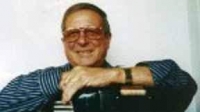
Renato Bui Musical artist Songs Weggis Yodel Polka Authentic Switzerland · 1995 Yodel of Joy Alpenmelodien · 2010
Dreams for Lovers Die Besten von damals · 2004.
Dreams for Lovers Die Besten von damals · 2004.
Isabelle Lepinay
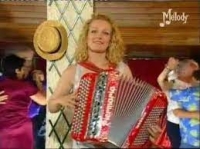
Songs Lépinette Lépinette · 2008 Amoureuse'Mans Lépinette · 2008 Blaze Away Les filles aux doigts d'or, Vol. 2 · 2002
Cette nana là ! Lépinette · 2008.
Cette nana là ! Lépinette · 2008.
Paul Mauriat
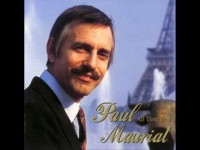
Paul Julien André Mauriat was a French orchestra leader, conductor of Le Grand Orchestre de Paul Mauriat, who specialized in the easy listening genre. He is best known in the United States for his million-selling remake of André Popp's "Love is Blue", which was #1 for 5 weeks in 1968
Schubert

Franz Peter Schubert (January 31, 1797 – November 19, 1828) was an Austrian composer. He wrote some 600 lieder, nine symphonies (including the famous "Unfinished Symphony"), liturgical music, operas, and a large body of chamber and solo piano music. He is particularly noted for his original melodic and harmonic writing.
While Schubert had a close circle of friends and associates who admired his work (including his teacher Antonio Salieri, and the prominent singer Johann Michael Vogl), wider appreciation of his music during his lifetime was limited at best. He was never able to secure adequate permanent employment, and for most of his career he relied on the support of friends and family. Interest in Schubert's work increased dramatically in the decades following his death and he is now widely considered to be one of the greatest composers in the Western tradition.
While he was clearly influenced by the Classical sonata forms of Beethoven and Mozart (his early works, among them notably the 5th Symphony, are particularly Mozartean), his formal structures and his developments tend to give the impression more of melodic development than of harmonic drama. This combination of Classical form and long-breathed Romantic melody sometimes lends them a discursive style: his 9th Symphony was described by Robert Schumann as running to "heavenly lengths". His harmonic innovations include movements in which the first section ends in the key of the subdominant rather than the dominant (as in the last movement of the Trout Quintet). Schubert's practice here was a forerunner of the common Romantic technique of relaxing, rather than raising, tension in the middle of a movement, with final resolution postponed to the very end.
While Schubert had a close circle of friends and associates who admired his work (including his teacher Antonio Salieri, and the prominent singer Johann Michael Vogl), wider appreciation of his music during his lifetime was limited at best. He was never able to secure adequate permanent employment, and for most of his career he relied on the support of friends and family. Interest in Schubert's work increased dramatically in the decades following his death and he is now widely considered to be one of the greatest composers in the Western tradition.
While he was clearly influenced by the Classical sonata forms of Beethoven and Mozart (his early works, among them notably the 5th Symphony, are particularly Mozartean), his formal structures and his developments tend to give the impression more of melodic development than of harmonic drama. This combination of Classical form and long-breathed Romantic melody sometimes lends them a discursive style: his 9th Symphony was described by Robert Schumann as running to "heavenly lengths". His harmonic innovations include movements in which the first section ends in the key of the subdominant rather than the dominant (as in the last movement of the Trout Quintet). Schubert's practice here was a forerunner of the common Romantic technique of relaxing, rather than raising, tension in the middle of a movement, with final resolution postponed to the very end.
Juventino Rosas

José Juventino Policarpo Rosas Cadenas was a Mexican composer and violinist. Date of birth: January 25, 1868, Santa Cruz de Juventino Rosas Date and place of death: 9 July 1894, Batabano, Cuba Genre: Classical music Books: Sobre Las Olas
Ernesto Lecuona

Ernesto Lecuona y Casado (Spanish pronunciation: ; August 6, 1895 – November 29, 1963) was a Cuban composer and pianist of worldwide fame. He composed over six hundred pieces, mostly in the Cuban vein, and was a pianist of exceptional skill. His father was Canarian and his mother was Cuban.
Alexandra Paris
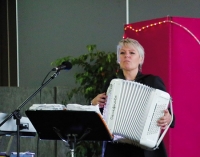
Alexandra Paris Musical artist Genre: Tango Albums: A L'accordéon : Tango, Country, Valse, Paso, Cha-Cha, Samba, Boléro, Tarentelle, Rumba Songs Mon Amant De St-Jean Double d'Or Accordéon · 2012 El Fuego Del Toro A L'accordéon : Tango, Country, Valse, Paso, Cha-Cha, Samba, Boléro, Tarentelle, Rumba · 2010 XXL A L'accordéon : Tango, Country, Valse,
Tom Waits

Thomas Alan Waits (born 7 December 1949) is an American singer-songwriter, composer, and actor. Waits has a distinctive voice, described by critic Daniel Durchholz as sounding "like it was soaked in a vat of bourbon, left hanging in the smokehouse for a few months, and then taken outside and run over with a car." With this trademark growl, his incorporation of pre-rock styles such as blues, jazz, and vaudeville, and experimental tendencies verging on industrial music, Waits has built up a distinctive musical persona. He has worked as a composer for movies and musical plays and as a supporting actor in films, including The Fisher King, Coffee & Cigarettes, Bram Stoker's Dracula, and Short Cuts. He was nominated for an Academy Award for his soundtrack work on One from the Heart.
Lyrically, Waits' songs contain atmospheric portrayals of bizarre, seedy characters and places, although he has also shown a penchant for more conventional ballads. He has a cult following and has influenced subsequent songwriters despite having little radio or music video support. His songs are best-known to the general public in the form of cover versions by more visible artistsâfor example, "Jersey Girl," performed by Bruce Springsteen; "Downtown Train" and "Tom Traubert's Blues" performed by Rod Stewart; and "Ol' '55," performed by the Eagles. Although Waits' albums have met with mixed commercial success in his native United States, they have occasionally achieved gold album sales status in other countries. He has been nominated for a number of major music awards and has won Grammy Awards for two albums, Bone Machine and Mule Variations.
Waits currently lives in Sonoma County, California with his wife and their three children.
Lyrically, Waits' songs contain atmospheric portrayals of bizarre, seedy characters and places, although he has also shown a penchant for more conventional ballads. He has a cult following and has influenced subsequent songwriters despite having little radio or music video support. His songs are best-known to the general public in the form of cover versions by more visible artistsâfor example, "Jersey Girl," performed by Bruce Springsteen; "Downtown Train" and "Tom Traubert's Blues" performed by Rod Stewart; and "Ol' '55," performed by the Eagles. Although Waits' albums have met with mixed commercial success in his native United States, they have occasionally achieved gold album sales status in other countries. He has been nominated for a number of major music awards and has won Grammy Awards for two albums, Bone Machine and Mule Variations.
Waits currently lives in Sonoma County, California with his wife and their three children.
Tchaikovsky

Pyotr Il'yich Tchaikovsky (May 7 1840 â November 6 1893) was a Russian composer of the Romantic era. While not part of the nationalistic music group known as "The Five", Tchaikovsky wrote music which, in the opinion of Harold Schonberg, was distinctly Russian: plangent, introspective, with modally-inflected melody and harmony.
Aesthetically, Tchaikovsky remained open to all aspects of Saint Petersburg musical life. He was impressed by Serov and Balakirev as well as the classical values upheld by the conservatory. Both the progressive and conservative camps in Russian music at the time attempted to win him over. Tchaikovsky charted his compositional course between these two factions, retaining his individuality as a composer as well as his Russian identity. In this he was influenced by the ideals of his teacher Nikolai Rubinstein and Nikolai's brother Anton.
Tchaikovsky's musical cosmopolitanism led him to be favored by many Russian music-lovers over the "Russian" harmonies and styles of Mussorgsky, Borodin and Rimsky-Korsakov.
Nonetheless he frequently adapted Russian traditional melodies and dance forms in his music, which enhanced his success in his home country. The success in St. Petersburg at the premiere of his Third Orchestral Suite may have been due in large part to his concluding the work with a polonaise. He also used a polonaise for the final movement of his Third Symphony.
Aesthetically, Tchaikovsky remained open to all aspects of Saint Petersburg musical life. He was impressed by Serov and Balakirev as well as the classical values upheld by the conservatory. Both the progressive and conservative camps in Russian music at the time attempted to win him over. Tchaikovsky charted his compositional course between these two factions, retaining his individuality as a composer as well as his Russian identity. In this he was influenced by the ideals of his teacher Nikolai Rubinstein and Nikolai's brother Anton.
Tchaikovsky's musical cosmopolitanism led him to be favored by many Russian music-lovers over the "Russian" harmonies and styles of Mussorgsky, Borodin and Rimsky-Korsakov.
Nonetheless he frequently adapted Russian traditional melodies and dance forms in his music, which enhanced his success in his home country. The success in St. Petersburg at the premiere of his Third Orchestral Suite may have been due in large part to his concluding the work with a polonaise. He also used a polonaise for the final movement of his Third Symphony.
Jaromír Vejvoda
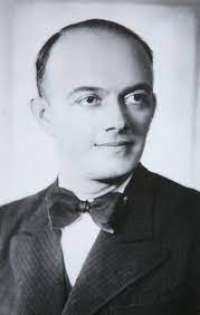
Jaromír Vejvoda Czech composer Jaromír Vejvoda was a Czech composer and the author of the "Beer Barrel Polka". Wikipedia Born: March 28, 1902, Zbraslav, Prague, Czechia Died: November 13, 1988, Zbraslav, Prague, Czechia
Children: Josef Vejvoda Grandchild: Zuzana Vejvodová Movies: The Elementary School Albums: King of Polka
Songs Kdyby Ty Muziky Nebyly Škoda Lásky Přes Dvě Vesnice
Children: Josef Vejvoda Grandchild: Zuzana Vejvodová Movies: The Elementary School Albums: King of Polka
Songs Kdyby Ty Muziky Nebyly Škoda Lásky Přes Dvě Vesnice
Mariano Mores

Mariano Alberto Martínez, known professionally as Mariano Mores, was an Argentine tango composer and pianist.
Date of birth: February 18, 1918, San Telmo, Buenos Aires, Argentina Date and place of death: 13 April 2016, Buenos Aires, Argentina
Date of birth: February 18, 1918, San Telmo, Buenos Aires, Argentina Date and place of death: 13 April 2016, Buenos Aires, Argentina
Jean Harduin
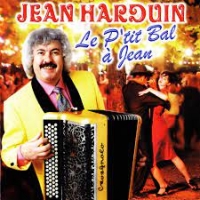
Jean Hardouin (English: John Hardwin; Latin: Johannes Harduinus; 1646 – 3 September 1729), French classical scholar, was born at Quimper in Brittany. Having acquired a taste for literature in his father's book-shop, he sought and obtained admission into the order of the Jesuits in around 1662 (when he was 16).
Lars Frankell

Lars Frankell is a musician and arranger known for her successful arrangements for old music, apart from her own compositions.
The Righteous Brothers

The Righteous Brothers are an American musical duo originally formed by Bill Medley and Bobby Hatfield but now comprising Medley and Bucky Heard. Medley formed the group with Hatfield in 1963.
David Tukhmanov
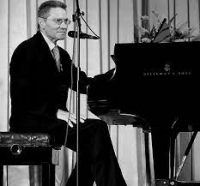
David Fyodorovich Tukhmanov PAR (Russian: Дави́д Фёдорович Тухма́нов, was born on July 20, 1940, in Moscow, Russian SFSR, Soviet Union) is a Soviet and Russian composer. People's Artist of Russia (2000), State Prize of Russian Federation (2003, 2019).
kal dompan

Swedish musician and composer. Born September 3, 1874 in Stockholm, Sweden — died October 12, 1931 in Spånga, Sweden. Aliases: Karl Lundin ...
Dave Brubeck

David Warren Brubeck (born December 6, 1920 in Concord, California), better known as Dave Brubeck, is an American jazz pianist. Regarded as a genius in his field, he has written a number of jazz standards, including "In Your Own Sweet Way" and "The Duke". Brubeck's style ranges from refined to bombastic, reflecting his mother's attempts at classical training and his improvisational skills. Much of his music employs unusual time signatures.
His long-time musical partner, alto saxophonist Paul Desmond, wrote the Dave Brubeck Quartet's most famous piece, "Take Five", which is in 5/4 time and has endured as a jazz classic. Brubeck experimented with time signatures through much of his career, recording "Pick Up Sticks" in 6/4, "Unsquare Dance" in 7/4, and "Blue Rondo à la Turk" in 9/8. He also provided music for the TV animated miniseries "This Is America, Charlie Brown".
His long-time musical partner, alto saxophonist Paul Desmond, wrote the Dave Brubeck Quartet's most famous piece, "Take Five", which is in 5/4 time and has endured as a jazz classic. Brubeck experimented with time signatures through much of his career, recording "Pick Up Sticks" in 6/4, "Unsquare Dance" in 7/4, and "Blue Rondo à la Turk" in 9/8. He also provided music for the TV animated miniseries "This Is America, Charlie Brown".
frank Marocco
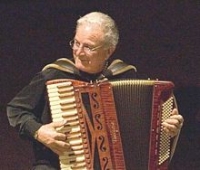
Frank L. Marocco (January 2, 1931 – March 3, 2012) was an American piano-accordionist, arranger and composer. He was recognized as one of the most recorded accordionists in the world.
Pietro Frosini

Pietro Frosini (9 August 1885 – 2 September 1951) was one of the first famous "stars of the accordion." He was born in Catania, Sicily, in 1885 and began to play the chromatic button accordion at the age of six. In 1905 he emigrated to San Francisco and was discovered by a talent scout for the Orpheum Vaudeville Circuit.Frosini made one of the first accordion recordings on a cylinder record for Edison in 1907 and made his first Victor recording in 1908. He traveled extensively on the vaudeville circuit in America and abroad and even performed for the King of England.
T.M. Revolution

Takanori Nishikawa is a Japanese musician, singer, songwriter, record producer, actor, voice artist, radio personality, and businessman. He performs under the stage name T.M.Revolution, which stands for "Takanori Makes Revolution", stemming from the famous '80s pop electronic band TM Network.
Astor Piazzola

Astor Pantaleón Piazzolla (Spanish pronunciation: , Italian pronunciation: ; March 11, 1921 – July 4, 1992) was an Argentine tango composer, bandoneon player, and arranger. His oeuvre revolutionized the traditional tango into a new style termed nuevo tango, incorporating elements from jazz and classical music. A virtuoso bandoneonist, he regularly performed his own compositions with a variety of ensembles.
In 1992, American music critic Stephen Holden described Piazzolla as "the world's foremost composer of tango music"
In 1992, American music critic Stephen Holden described Piazzolla as "the world's foremost composer of tango music"
Jo Privat
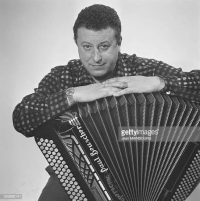
Jo Privat was a French accordionist and composer. Privat was born at Ménilmontant, Paris. He played for many years at Balajo, a musette club in Paris where he worked with Django Reinhardt, the Ferret Brothers, Didier Roussin and Patrick Saussois.
Libero Bovio
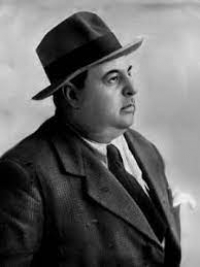
Libero Bovio was a Neapolitan lyricist and dialect poet. Bovio was one of those responsible for the rejuvenation of Neapolitan dialect in plays, poetry and song at the beginning of the twentieth century. He took odd jobs at newspapers and then went to work in the export office of the National Museum.
Katica Illényi

Katica Illényi (Hungarian: ) is a Hungarian violinist, singer, dancer and theremin player. She has classical training, and plays in several musical genres including folk music, klezmer and Manouche jazz.
Mykola Ivanovych Rizol

Mykola Ivanovych Rizol Ukrainian composer Born: December 19, 1919, Dnipro, Ukraine Died: March 17, 2007, Kyiv, Ukraine.
Nikolai Ryskov

Nikolai Ryskov is a Russian Accordion-Bayan player and living now permanently in the UK.He graduated at
the Russian Academy of Music of Gnessin in 1994 in Moscow. He is arranging any kind of music for Accordion Solo.
He is very fond of Astor Piazzolla music and is arranging it for Accordion Solo and Duo Accordions.
the Russian Academy of Music of Gnessin in 1994 in Moscow. He is arranging any kind of music for Accordion Solo.
He is very fond of Astor Piazzolla music and is arranging it for Accordion Solo and Duo Accordions.
Yann Tiersen

Guillaume Yann Tiersen (born 23 June 1970) is a French musician and composer known internationally for composing the score to the Jean-Pierre Jeunet movie Amélie. His music is recognized by its use of a large variety of instruments in relatively minimalist compositions, often with a touch of either European classical music or French folk music, using primarily the piano, accordion or violin together with instruments like the melodica, xylophone, toy piano, ondes martenot, harpsichord and typewriter. His musical style is reminiscent of Frédéric Chopin, Erik Satie, Philip Glass and Michael Nyman.
Yuri Peshkov

Yuri Peshkov (1940, Leningrad) - accordionist, composer, teacher.
 Download Sheet Music Net is a site for those who wants to access popular sheet music easily,
letting them download the sheet music for free for trial purposes.
It's completely free to download and try the listed sheet music, but you have to delete the files after 24 hours of trial.
Don't forget, if you like the piece of music you have just learned playing,
treat the artist with respect, and go buy the original sheet music.
Download Sheet Music Net is a site for those who wants to access popular sheet music easily,
letting them download the sheet music for free for trial purposes.
It's completely free to download and try the listed sheet music, but you have to delete the files after 24 hours of trial.
Don't forget, if you like the piece of music you have just learned playing,
treat the artist with respect, and go buy the original sheet music.
